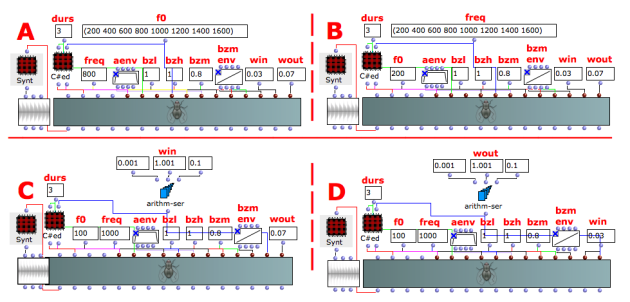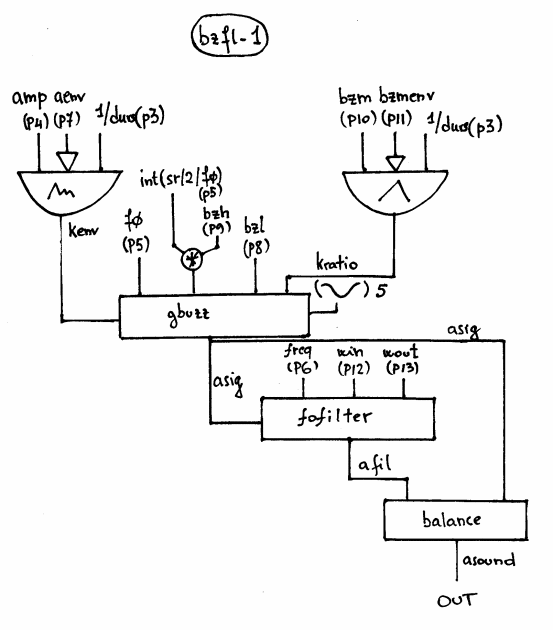Buzz Synthesis with BUZFL-1
Tutorial BUZFL-1
Name | Description | Default value |
|---|---|---|
amp | Maximum Amplitude. Linear from >0.0 to 1000 or in dB from 0 to -∞ (see Tutorial Getting Started 02 - Amplitude and Internal Editor for more details) | -6.0 |
f0 | Generating frequency [Hz] | 263.8 |
freq | Filter centre frequency [Hz] | 1000.0 |
aenv | Amplitude Envelope [GEN] | Instance: GEN07 |
bzl | Lowest harmonic present in the buzz [int] | Instance: GEN07 |
bzh | Highest harmonic present in the buzz [% of sr/2/f0. From 0.0 to 1.0] | 1.0 |
bzm | Multiplier in the series of amplitude coefficients [flt] | 0.95 |
bzmenv | Envelope of the buzz multiplier [GEN] | Instance: GEN07 |
win | Impulse response attack time [sec] | 0.03 |
wout | Impulse response decay time [sec] | 0.07 |
The BUZZ-1 Class realizes a Buzz Synthesis (a set of harmonically related cosine partials) plus a formant filter with the following controls:
- The main amplitude,
- The generating frequency,
- The filter centre frequency,
- The amplitude envelope by means of a GEN routine,
- The lowest and the highest harmonic of the spectrum,
- The components' amplitude of the spectrum,
- The components' amplitude envelope by means of a GEN routine,
- The impulse response attack time,
- The impulse response decay time.
The example A focuses on the values of the generating frequencies.
The example B deals with the filter centre frequency.
The example C spreads the impulse response attack time from 0.001 to 1.001 second with 0.1 time steps.
The example D spreads the impulse response decay time from 0.001 to 1.001 second with 0.1 time steps.
For the red patch C#ed and Synt see Appendix A
Inside the Class
instr 1
idur = p3
idurosc = 1/p3
iamp = (p4 > 0.0 ? (p4*0.001*0dbfs) : (ampdbfs (p4)))
if0 = p5
ifq = p6
iaenv = p7
inn = sr/2/if0 ; total possible number of harmonics
ihh = int (inn * p9) ; % of possible total
ilh = p8 ; lowest harmonic
ibzmul = p10
ibzmenv = p11 ; envelope for the buzz
irise = p12
idec = p13
ifn = 5 ; stored cosine function
kenv poscil iamp, idurosc, iaenv ; amp envelope
kratio poscil ibzmul, idurosc, ibzmenv ; kratio envelope
asig gbuzz kenv,if0,ihh,ilh,kratio,ifn
afil fofilter asig, ifq, irise, idec
asound balance afil, asig
out asound
endin
- OMChroma User Manual
- System Configuration and Installation
- Getting started
- Managing GEN function and sound files
- Predefined Classes
- Additive Synthesis
- Buzz Synthesis
- Buzz Synthesis with BUZZ-1
- Buzz Synthesis with BUZZ-2
- Buzz Synthesis with BUZFL-1
- Frequency Modulation Synthesis
- Formant Wave-Function Synthesis (FOF)
- Granular Formant Wave Function (FOG)
- Karplus-Strong
- Random Amplitude Modulation
- Sampler
- Subtractive Synthesis
- Wave Shaping Synthesis
- Hybrid Models
- User-fun
- Creating a new Class
- Multichannel processing
- Appendix A - Common Red Patches


